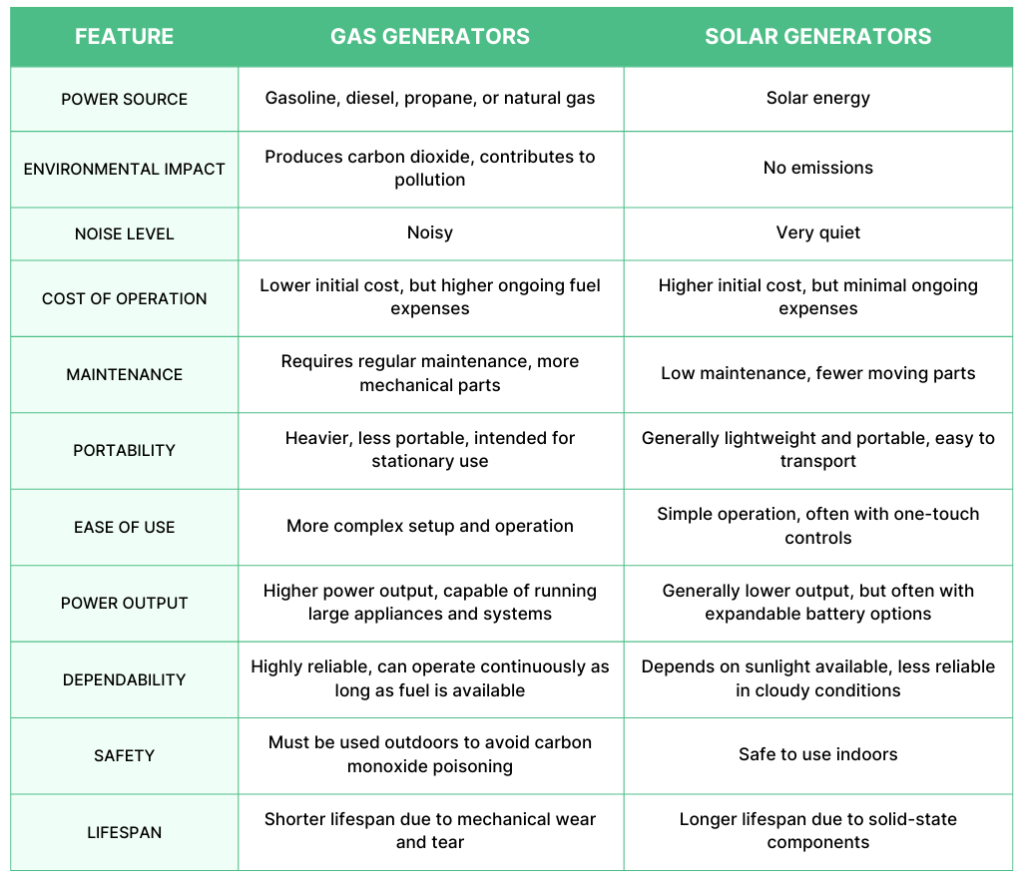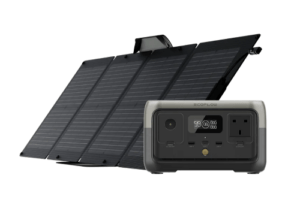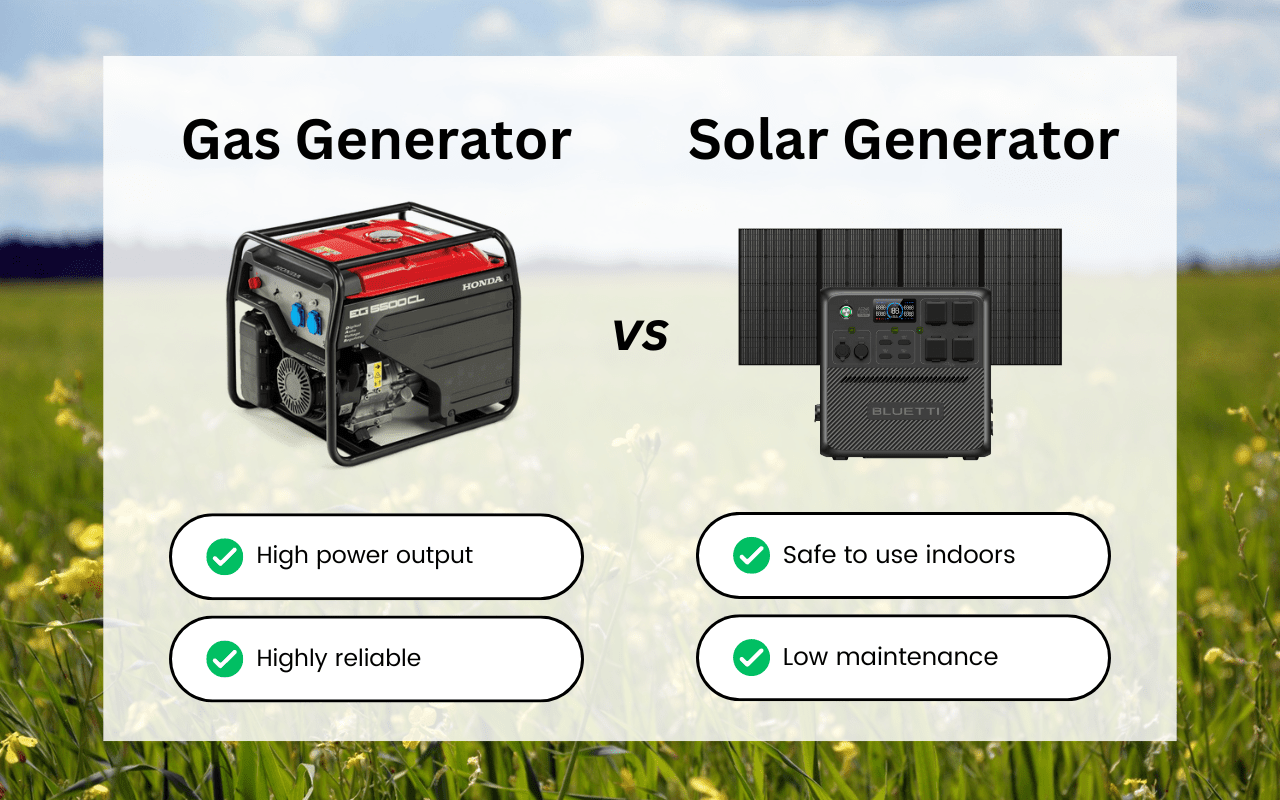As power outages become more frequent, it is highly recommended to invest in your own backup power system which is both effective and reliable in times of need. This article compares solar and gas generators, focusing on their efficiency, environmental impact, cost, and usability. We’ll break down the pros and cons of each, helping you make an informed decision based on your home’s energy needs and sustainability goals.
Table of Contents

Our Best Solar Generator Picks
Budget:
EcoFlow RIVER 2 Solar Generator

Included: 1x 110W solar panel
Price (UK): £388 (£458 full price)
Price (US): $449 ($638 full price)
Power (W): 300
Capacity (Wh): 300
Cell chemistry: LiFePO4
Weight: 7.8 lbs
Dimensions: 9.6 x 8.5 x 5.7 in
Warranty: 5 years (2 years for panels)
Not expandable. Recharging by AC (1 hour), solar (3 hours), car, USB-C.
Premium:
BLUETTI AC200MAX Solar Generator

Included: 3x 200W solar panels
Price (UK): £2,096 (£3,296 full price)
Price (US): $2,499 ($3,399 full price)
Power (W): 2,200
Capacity (Wh): 2,048
Cell chemistry: LiFePO4
Weight: 61.9 lbs
Dimensions: 16.5 x 11 x 15.2 in
Warranty: 2 years
Expandable with up to 2x B230 or 2x B300 batteries.
Recharging times:
AC (500W): 5.5-6 hours.
Solar (900W): 3-3.5 hours.
Car (12/24V): 10-20 hours.
AC + solar (1400W): 2-2.5 hours.
Gas Generators: Pros and Cons
Gas generators have long been a staple in backup power solutions for both residential and commercial settings. They are known for their robust performance and reliability, making them a popular choice for emergency power.
Advantages of Gas Generators
- Immediate power supply: Gas generators can produce a significant amount of electricity as soon as they are turned on. This makes them extremely useful in situations where power is needed immediately, such as during outages following severe weather events.
- High power output: Capable of generating substantial amounts of electricity, gas generators can power everything from essential household appliances to entire home systems or commercial operations.
- Availability of fuel: Gasoline, the most common fuel for these generators, is widely available, making it easy to refuel and maintain continuous operation during extended periods without electricity.
- Cost-effective initial investment: Compared to solar generators, gas generators often have a lower upfront cost, which can make them more accessible for immediate emergency use.
Disadvantages of Gas Generators
- Noise and pollution: Gas generators are known for being noisy, which can be disruptive, and they emit pollutants such as carbon dioxide and other exhaust gases, contributing to environmental pollution and greenhouse gas emissions.
- Ongoing fuel costs: Unlike solar generators that utilize free sunlight, gas generators require a continuous supply of gasoline or other fuels, which can become expensive, especially during long-term use or when fuel prices are high.
- Maintenance requirements: They require regular maintenance, including oil changes, fuel filter replacements, and general upkeep to ensure they operate effectively and safely.
- Safety concerns: The combustion of gas can pose safety risks, including carbon monoxide poisoning if not used in well-ventilated areas. Proper storage of flammable fuels is also a critical safety concern.
- Dependence on fuel availability: In disaster scenarios, fuel can become scarce or difficult to obtain, which may render gas generators unusable when needed most.

Solar Generators: Pros and Cons
Solar generators, which are effectively just portable power stations coupled with compatible solar panels, are the a popular renewable alternative for backup power. They convert sunlight directly into electricity, storing it in high-capacity batteries for later use. This process is entirely emission-free, making solar generators an eco-friendly choice compared to traditional fuel-based systems.
Advantages of Solar Generators
- Eco-friendly: Solar generators do not emit carbon dioxide or other pollutants, which makes them environmentally sustainable. Their clean energy production aligns with global efforts to reduce greenhouse gas emissions.
- Cost-effectiveness over time: After the initial investment, solar generators have minimal ongoing costs. Sunlight, their primary “fuel,” is free, significantly reducing operational expenses over the generator’s lifespan.
- Quiet operation: Unlike gas generators that can be noisy, solar generators operate silently. This makes them ideal for residential areas and recreational use like camping where noise would be a concern.
- Portability: Designed to be lightweight and compact, solar generators are easy to transport and set up, offering flexibility for both home and outdoor use.
- Low maintenance: With fewer moving parts than gas generators, solar generators require less maintenance, which can translate to lower long-term costs and less hassle.
- Versatility: The portable power station unit that makes up a solar generator can also be recharged via AC and car, giving you extra versatility when it comes to topping them up.
Disadvantages of Solar Generators
- Dependency on weather: Solar generators rely on sunlight, which can be inconsistent depending on geographic location, season, and daily weather conditions. In regions with limited sunlight, especially during winter, their effectiveness diminishes.
- Higher initial cost: The upfront cost of purchasing a solar generator can be high, particularly for units with substantial energy storage capacity. This initial investment can be a barrier for some users.
- Energy storage limitations: While solar generators can store energy for use when sunlight is not available, their storage capacity is finite. In prolonged outage situations without sunlight, this can be a significant limitation.
Performance and Efficiency
Gas Generators
Gas generators can reliably provide immediate power supply, which is crucial in emergency situations. The primary limitation in their efficiency lies in their fuel consumption and the need for continuous refueling, which can be both costly and logistically challenging during extended outages or when fuel is scarce.
Solar Generators
Solar generators are efficient in converting sunlight to electricity without any moving parts, resulting in less wear and tear and lower maintenance costs. They convert sunlight into electricity during daylight hours and use effective battery storage technologies (with most models now using LiFePO4 batteries), allowing for energy storage and use during non-sunny periods. However, their performance can be limited in regions with less sunlight or during prolonged periods of bad weather.
Environmental Impact
Gas Generators
Gas generators burn fossil fuels to generate electricity, leading to the emission of carbon dioxide, nitrogen oxides, and other pollutants that contribute to air pollution and climate change. The environmental impact is considerably higher than for solar generators, especially if used frequently or for prolonged periods.
Solar Generators
One of the most significant advantages of solar generators is their minimal environmental impact. They produce no emissions, reducing the carbon footprint associated with their use. This clean energy source contributes to reducing overall greenhouse gas emissions and is aligned with global efforts towards sustainability.
Cost Analysis
Gas Generators
Typically, gas generators have a lower initial purchase price, however the long-term costs can accumulate due to ongoing fuel expenses, maintenance, and potential repairs. Fuel price volatility can also impact overall expenses unpredictably, which might not be the case with solar energy that relies on the free and consistent availability of sunlight.
Solar Generators
The initial cost of solar generators can be higher due to the need for purchasing solar panels, batteries, and other components. However, the ongoing operational costs are significantly lower since they do not require fuel purchases. Over time, the investment in solar technology can pay off, especially with the added benefits of tax incentives, rebates, and decreasing costs of solar components.
Safety Considerations
Gas Generators
The presence of safety features in gas generators is particularly important due to the inherent risks of operating combustible engines. Modern gas generators often come with CO detectors and auto-shutdown features that activate if dangerously high CO levels are detected. They also include circuit breakers to prevent overload and ensure the generator doesn’t contribute to electrical fires. Proper ventilation and sturdy construction also play key roles in enhancing safety.
Solar Generators
Solar generators are generally safer than gas generators, as they do not involve combustion and therefore eliminate risks associated with carbon monoxide (CO) poisoning. Most models are equipped with built-in safety mechanisms such as automatic shut-offs if the system overheats or if there are electrical faults. They also typically feature solid-state electronics with minimal moving parts, which reduces the risk of mechanical failures.
Many new models of portable power station are now made with LiFePO4 batteries, which have a superior safety profile to the Lithium ion or NCM alternatives, and also have a substantial life span (typically 3500+ cycles before dropping to 80% of their original capacity). They also often come with integrated BMS (Battery Management System). It is recommended you always check the safety certifications of solar generators and portable power stations before puchasing.
Conclusion: Gas Generators vs Solar Generators
Despite their initial higher cost, solar generators offer long-term savings and are less dependent on fluctuating fuel prices, unlike gas generators, which entail ongoing fuel expenses and are affected by fuel availability. In terms of safety and ease of use, solar generators pose fewer hazards since they do not produce toxic emissions or loud noise, unlike gas generators, which require strict adherence to safety guidelines to manage their noxious fumes and noise.
Choosing between a solar and a gas generator ultimately depends on your individual needs, environmental considerations, and the frequency and duration of power outages anticipated. Each type provides reliable backup power, yet they serve different purposes and come with distinct operational and maintenance demands. Whatever you go for, investing in your own generator for power backup needs is a smart choice.
For further reading, you may be interested in:
Solar Trek is all about breaking down information about solar-powered brands and products into a helpful, easily digestible format. All of our content is totally objective, aimed at helping you to make the best purchasing decisions for your solar needs. If you click our links and make a purchase, we may earn some commission at absolutely no extra cost to you, but this does not interfere with our goals of providing 100% helpful, informative, and objective information.





